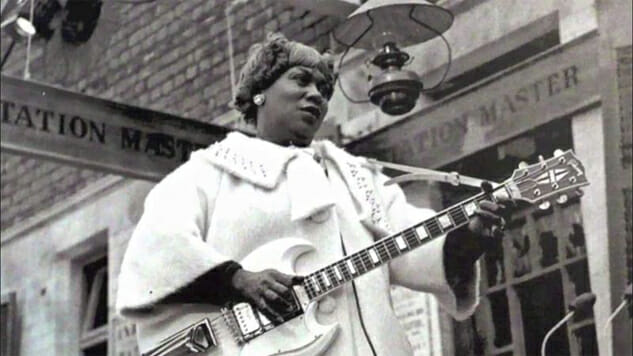The 7 Best Sister Rosetta Tharpe Live Recordings

Sister Rosetta Tharpe, known as the Godmother of Rock ’n’ Roll, is still underappreciated in official histories and halls, but her influence on the early years of the genre is transparently clear especially in her live recordings. The interplay of gospel and rock ’n’ roll is often associated with Ray Charles and Elvis Presley, but Sister Rosetta is arguably more revolutionary because her religious fervor becomes more pronounced, and her performances more ferocious. Whereas Elvis translates gospel into something sexy, Sister Rosetta translates rock ’n’ roll into something holy.
Though Tharpe first achieved prominence as a jazz singer in the big band era, scoring hits with Tommy Dorsey’s and Duke Ellington’s bands, her mastery of guitar language and tonality flourished into a transcendent art. Here are seven of the most joyful, fearsome and beautiful live performances we can find by the great Sister Rosetta Tharpe.
7. “When the Saints Go Marching In”
Sister Rosetta made a splash at the Newport Jazz Festival in 1964 and the excellent recordings from the set have become canonic (as evidenced by all the Paste Cloud inclusions here). Here she puts this New Orleans standard into her own jazz-gospel language and you can hear her engaging the crowd into participation, making for a blissful live classic.
6. “Old Time Religion”
This video captures the brilliance of Sister Rosetta’s sense of joy in both performance and the gospel. We see the dancing, playful and celebratory side of a performer whose ability to convey sensation and emotion is the palpable testament to the faith she shares through her words.
5. “That’s All”
Sister Rosetta is a master of many moods, but one of her best is the righteous rebuke. She layers a humorous energy into her vocal performance here, as she aggressively calls on people who, “don’t understand the good book right,” to show more respect. Tharpe played with many different jazz ensembles over the years and the instrumentation of this take perfectly mirrors her brassy and confrontational vocal tone. The interplay of her guitar with the trombone solo is a golden moment that transforms polyphony into conversation, modeling the “understanding” the lyrics call for.
-

-

-

-

-

-

-

-

-

-

-

-

-

-

-

-

-

-

-

-

-

-

-

-

-

-

-

-

-

-

-

-

-

-

-

-

-

-

-

-








































